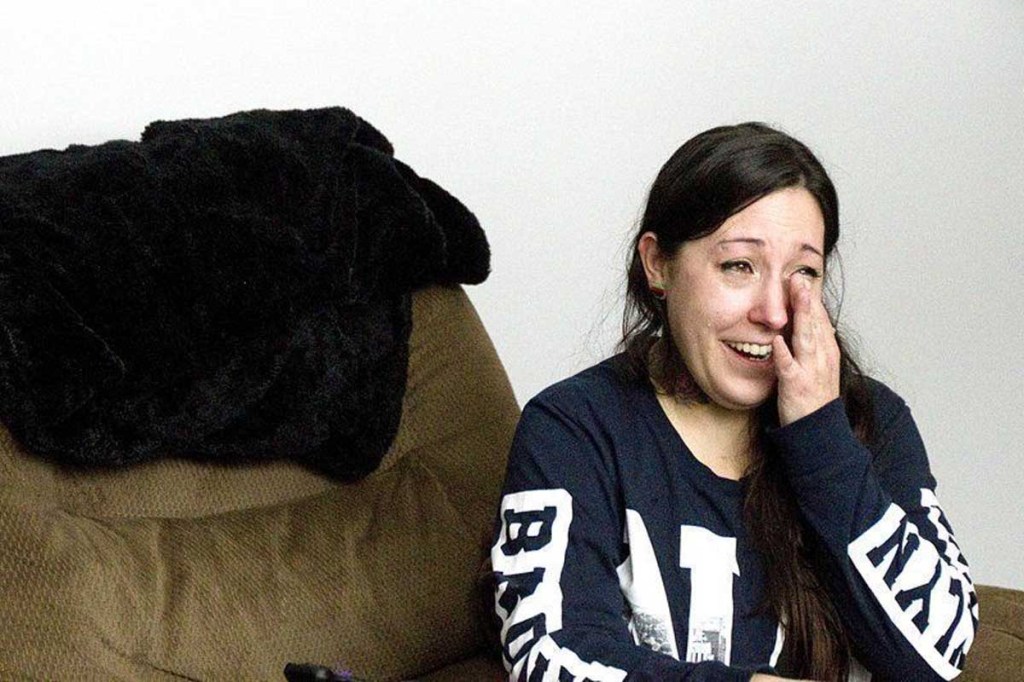For infants in withdrawal opioid crisis begins at birth
Published 2:00 pm Tuesday, March 22, 2016

- Ashli Green wipes a tear from her eyes while recalling a dream she had about her son while in jail. “I had the most amazing dream that he slept in bed with me, and I sung a song to him,” she said. “It was so real, so amazing. I woke up like ‘thank you, thank you God for giving me that night with him.’ How lucky am I to stay a night with him, you know? That’s a blessing.”
MANCELONA, Mich. — Ashli Green watched while her pink-cheeked son, Paiden, teetered on wobbly legs, taking small, careful steps across the living room inside their small, but cozy home.
It’s a scene she would have written off as impossible just two years ago.
Paiden, at 10 months old, is another mark of his mother’s strides to recover from the addiction tormenting her since she was a teenager. Green said she tried about every drug available by age 15. Heroin was the ultimate high, and withdrawing from it was the ultimate low.
“I felt like I was dying,” Green said. “You live in the bathroom. You don’t sleep for days and days on end. Your knees feel like they’re broken… You start literally feeling like you’re mentally losing your mind.”
Green, 27, has been sober for almost two years. She has a job, a flat-screen TV, a home with a Bible in every corner. It’s a life in contrast with her using days, when she lived in public bathrooms and on friends’ couches, focused on her next high.
Paiden is Green’s third child, but the only one in her custody. Her older son and daughter were taken from her care because of her drug use which, in the case of her daughter, Green said occurred during pregnancy.
Green’s daughter was one of hundreds of babies born in Michigan that year with symptoms of opioid withdrawal — a rising trend in hospitals across the state.
There were 815 babies with withdrawal symptoms born in Michigan in 2014, Michigan Department of Health and Human Services figures show. There were 416 born with the symptoms in 2010, and just 56 in 2000.
A late-2015 investigation by Reuters found more than 27,000 diagnosed cases of drug-dependent newborns across the country in 2013, based on discharge data from hospitals.
It’s an unpleasant beginning.
Babies born going through withdrawal are jittery, said David Sciamanna, a neonatologist at Munson Medical Center in Traverse City, Michigan. They’re sweaty and have high-pitched cries. They have difficulty eating, loose stools and they sometimes vomit, causing them to lose weight and get dehydrated.
Munson doctors use Methadone to soothe the babies, who typically survive if they get treatment to avoid seizures and dehydration.
Sciamanna said he saw an uptick in babies born with withdrawal starting around 2010. That was about the time doctors started forming an approach to caring for the babies and working with their mothers. Doctors use a measure called the Finnegan Neonatal Abstinence score to determine the severity of babies’ symptoms and necessary treatment.
Doctors should reach out to pregnant women about their opioid use early and get them good prenatal care, Sciamanna said.
“If they don’t get good obstetric care you have a risk of prematurity or poorly growing babies or other medical problems, in addition to being exposed to the mom’s opioids or the mom’s drugs,” he said.
Pregnant women can take buprenorphine, known as Subutex, or Methadone — prescription drugs used to help addicts reduce cravings. Doctors monitor the drugs, which are safer than heroin and opioid prescription drugs, said Debbie Aldridge, personal health supervisor for the Benzie-Leelanau District Health Department.
Aldridge said women are prescribed medicine because withdrawal is dangerous for fetuses. Her patients use Subutex, because the nearest Methadone clinic is too far for a women early in their treatment to travel every day to get a dose.
“That’s not an option for our women,” she said.
Subutex is covered by Medicaid, said Sara Sircely, substance use disorder coordinator with the Northern Michigan Regional Entity, an organization that manages mental health and substance abuse services in the region.
But Medicaid only covers Subutex for one year, something Sircely said becomes a “severe limitation” for some patients.
“If you can, imagine having a 1-year-old and being told the medicine you’ve been on to help you not get sick you can’t have anymore,” she said.
Sciamanna argued addiction should be treated like a disease. Patients with diabetes, heart disease or hypertension don’t lose their medication after a year.
“Maybe they need it for two years or three years,” he said. “Maybe they’re weaning so it’s going to take time.”
But weaning with medicine doesn’t work for everybody. Green said she was prescribed Subutex when she was pregnant with her daughter, but she abused that, too, injecting it into her veins.
“I will abuse them. I am an addict and I will abuse them,” she said, acknowledging others find the medicines helpful. “I’ve seen it help people amazingly to where their life is totally different and I don’t know what they’d do if they ever got off.”
Green said pregnant women addicted to drugs need to know their options and the consequences the substances could have on their babies — she wishes doctors had told her more firmly about the repercussions of her drug use, but admitted she may not have listened.
Green contended there should be brochures in waiting rooms and commercials on television to spread information about pregnancy and substance abuse, and assurances that women may be able to keep their babies if they seek treatment.
“There’s no information out there,” she said. “Pregnant women are scared to death to get help, because if they reach out for help they’re afraid that if they have kids their kids are going to get taken, people are going to find out they are using.”
Prescription drug and opioid use is on the rise in Michigan, as is indicated by a 14 percent spike in overdose deaths in 2014, according to state data. There were 455 drug overdose deaths in Michigan in 1999, and 1,745 in 2014.
Drug use doesn’t always start on the street, Aldridge said. It sometimes starts in a doctor’s office.
Aldridge estimated half of the women she cares for became addicted to opioids after taking them as prescribed to manage pain after injury or surgery. And pregnant women face more stigma about drug abuse than most users.
“I think addiction can happen to anybody,” she said. “People get more judgmental when it happens to somebody who’s pregnant, or when you get pregnant (while you’re addicted).”
Sciamanna argues access to treatment should be increased so every woman can get medication and counseling in her county. Anything to make it easy for moms to get sober.
“If you don’t take care of the mom, you can’t take care of the baby,” Sciamanna said.
Aldridge is optimistic about substance abuse treatment for pregnant women. She said motherhood can inspire women to get clean, to leave drugs behind.
It worked for Green, who discovered she was pregnant with Paiden while she was in jail, awaiting trial after she was arrested for stealing copper. She planned to give Paiden to an adoption agency.
“I needed to work on myself,” Green said. “(I thought) ‘how could I work on anything else right now? I can’t imagine raising another baby, and what are people going to think? Can I even keep another baby? I got my kids taken.’”
The news of her pregnancy came after Green committed herself to getting clean. Her best friend had gone missing, her family members were either behind bars or uncommunicative, her children had been fully adopted by another family.
The thought of the two children she may never see again was so distressing Green prayed that she would forget them, although she asked God if they would remember her.
But a friend counseled her from the thought. Green realized she didn’t want to forget her children, she couldn’t. Then came a vivid dream about the son who she said was taken into state custody.
“I had the most amazing dream that he slept in bed with me, and I sung a song to him,” she said. “It was so real, so amazing. I woke up like ‘thank you, thank you God for giving me that night with him.’ How lucky am I to stay a night with him, you know? That’s a blessing.”
Green ultimately decided to keep Paiden — she reasoned that if she can recover from drugs, she could do anything.
It’s a message she tries to impart on the people she addresses at treatment centers and recovery groups across the region. Green speaks openly to help drug addicts recover and live clean, sober lives. Do good things, and good things will happen to you.
“So many give up before the miracle happens,” she said.
Thompson writes for The Traverse City, Record-Eagle.





